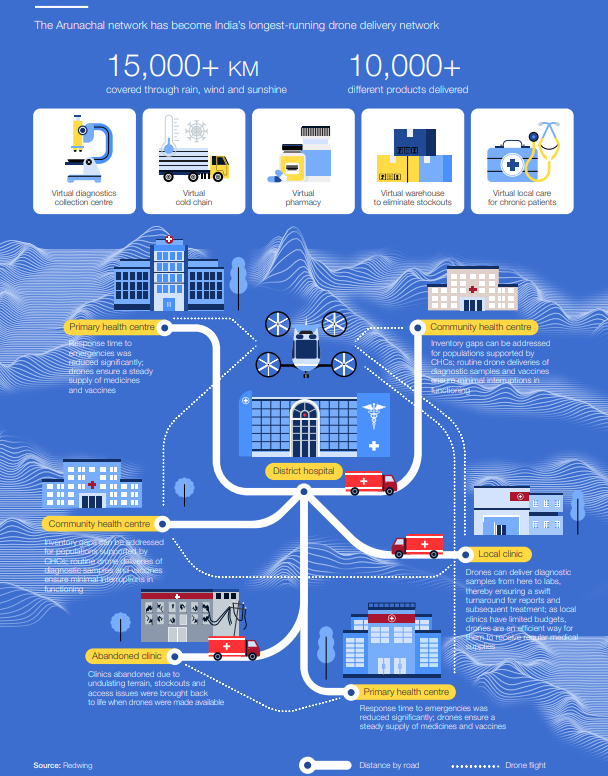Subtotal $0.00
- Healthcare delivery by drone is transforming access to medicines in India.
- The Medicine from the Sky drones have delivered 10,000+ medical products.
- The World Economic Forum partnered with local organizations on the drone project.
The World Economic Forum’s Medicine from the Sky initiative, a partnership with local healthcare providers, has completed almost a thousand flights – bringing much-needed medical supplies to isolated communities.
 Local healthcare workers prepare a medical delivery drone for flight in India. Image: Redwing
Local healthcare workers prepare a medical delivery drone for flight in India. Image: Redwing
Crossing healthcare frontiers
The first phase of Medicine from the Sky began in southern India’s Telangana state. It saw drones deliver medicines for 300 vaccine trials. Working in collaboration with Apollo Hospitals, Healthnet Global and think tank NITI Aayog, the Telangana test flights established a proof-of-concept for healthcare delivery by drone.
Discover
What is the World Economic Forum doing to improve healthcare systems?
The World Economic Forum’s Centre for Health and Healthcare works with governments and businesses to build more resilient, efficient and equitable healthcare systems that embrace new technologies.
Learn more about our impact:
- Global vaccine delivery: Our contribution to COVAX resulted in the delivery of over 1 billion COVID-19 vaccines and our efforts in launching Gavi, the Vaccine Alliance, has helped save more than 13 million lives over the past 20 years.
- Davos Alzheimer’s Collaborative: Through this collaborative initiative, we are working to accelerate progress in the discovery, testing and delivery of interventions for Alzheimer’s – building a cohort of 1 million people living with the disease who provide real-world data to researchers worldwide.
- Mental health policy: In partnership with Deloitte, we developed a comprehensive toolkit to assist lawmakers in crafting effective policies related to technology for mental health.
- Global Coalition for Value in Healthcare: We are fostering a sustainable and equitable healthcare industry by launching innovative healthcare hubs to address ineffective spending on global health. In the Netherlands, for example, it has provided care for more than 3,000 patients with type 1 diabetes and enrolled 69 healthcare providers who supported 50,000 mothers in Sub-Saharan Africa.
- UHC2030 Private Sector Constituency: This collaboration with 30 diverse stakeholders plays a crucial role in advocating for universal health coverage and emphasizing the private sector’s potential to contribute to achieving this ambitious goal.
Want to know more about our centre’s impact or get involved? Contact us.
In the second phase of the trial, drones were launched into much more complex terrain in the Himalayan state of Arunachal Pradesh. Despite the challenges that come with operating drones in high-mountain landscapes, the deliveries have brought dramatic improvements to healthcare provision for people in the region, reaching some remarkable milestones.

An assessment of the progress so far includes the following highlights:
- More than 650 drone flights completed
- More than 10,000 medical products delivered in total
- Flights have covered 15,000km in equivalent ground distance.
One of the most striking outcomes has been the dramatic reduction in delivery times. Journeys that once took eight hours by ground transport have been slashed to just 22 minutes, as the drones fly directly to the customer rather than having to navigate dangerous mountain roads. This has cut emergency response times, saving lives in critical situations.
Flying medicines to patients also cuts out the need for patients in isolated areas to attend clinics to access drugs. In mountainous regions, such journeys can take days and cost thousands of rupees.
 A Medicine from the Sky drone soars above the Himalayan landscape in India. Image: Redwing
A Medicine from the Sky drone soars above the Himalayan landscape in India. Image: Redwing
The project’s achievements have been recognized by the International Civil Aviation Organization (ICAO) for its innovative use of drones to enhance health supply chains in the region. Commenting on the award, Sebastian Buckup, who leads Network and Partnerships in the World Economic Forum’s Centre for the Fourth Industrial Revolution, said:
“The Medicine from the Sky initiative exemplifies the remarkable potential of innovation and collaboration. The pilot programmes in India, especially the Himalayan region, have vividly illustrated how technology can transcend geographical challenges, delivering vital healthcare products directly to people’s doorsteps. The World Economic Forum is honoured to showcase this initiative as a powerful example of how technology-based solutions can address and overcome global challenges.”
Benefits beyond immediate healthcare
Operating a fleet of drones in an isolated and mountainous region requires a skilled workforce and a robust healthcare supply chain to ensure medicines are available and kept in optimal condition.
The Medicine from the Sky project has created new jobs for local people. Jasmine Nikh became Arunachal Pradesh’s first female drone pilot. In all, 15 local youths have been employed to operate and service the drone deliveries.
The drones are also helping to reduce the environmental footprint of healthcare deliveries.

Drones powered by electric motors produce no CO2 emissions during use, which means they have the potential to reduce the impact caused by traditional delivery vehicles that burn fossil fuels. In the longer term, drones may reduce the pressure to build new roads, as more advanced drones could be introduced to further improve delivery systems and operate as flying taxis or even ambulances.
The trials in India have demonstrated the potential of drones to transform healthcare and other services across inaccessible regions around the globe, where deliveries by road are impossible or impractical. A public/private partnership approach can unlock growth, investment in research and development, empower local communities and most importantly of all, give millions of people rapid access to vital healthcare services.




